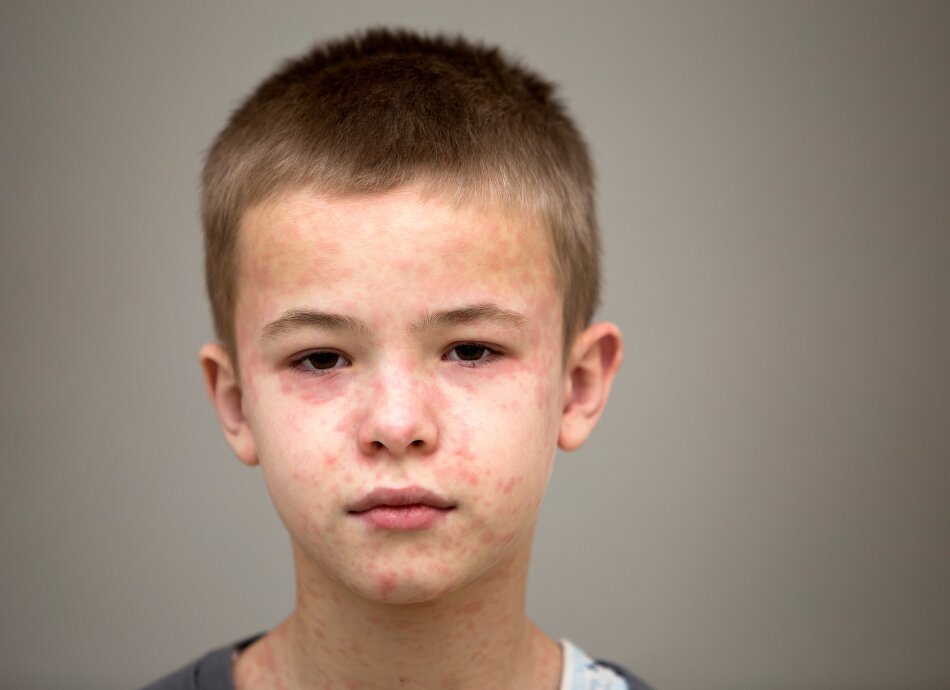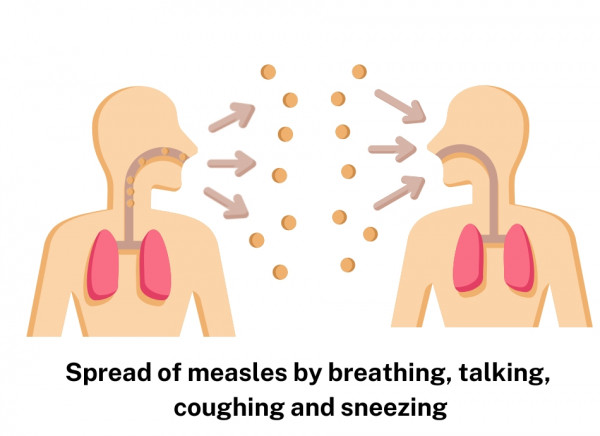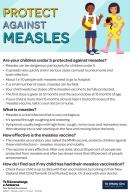If you're a frequent visitor to Healthify, why not share our site with a friend? Don't forget you can also browse Healthify without using your phone data.
Measles
Also known as English measles
Key points about measles
- Measles is a very infectious viral illness (easily spread from person to person) that can lead to serious complications for tamariki and adults.
- The measles virus lives in the nose and throat mucus of an infected person and can be easily spread through coughing and sneezing.
- Vaccination is the best way to protect yourself, your whānau and community from catching and spreading measles.

There are locations of interest – places that were visited by somebody with measles while they may have been infectious. See the measles locations of interest in Aotearoa New Zealand(external link) and if you were in one of those places at the same time, watch out for symptoms.
Get vaccinated against measles
Aotearoa New Zealand is at very high risk of a measles outbreak. You can find details of the latest exposures(external link) on this Health New Zealand | Te Whatu Ora page.
- Measles spreads very quickly and can cause serious complications.
- Please be aware of measles symptoms, including fever, cough and rash.
- If you are not immune and have been exposed to measles, MMR vaccination within 72 hours of exposure may provide protection and help limit the spread.
- Get vaccinated to protect yourself and your loved ones from catching and spreading measles. If you're not sure if you need a measles vaccine, find out by answering the questions on this immunisation page(external link).
Video: Measles
Watch a video about measles.
Measles is a serious illness caused by the measles virus that lives in the nose and throat mucus of an infected person. It can easily spread to others through coughing and sneezing. Measles can cause serious complications in children and adults. These include ear infections, pneumonia (chest infection), encephalitis (swelling of the brain) and death. About 1 in 10 people with measles will need hospital treatment.
The measles virus spreads easily through the air by sneezing, coughing or even just talking and breathing. It's one of the most infectious viruses there is. Measles can also be spread by contact with surfaces contaminated with an infected person’s nose and throat secretions (snot and saliva). If you're not immune, and you’ve been in the same room as someone with measles, you are very likely to catch it. It can stay in the air for about 1 hour.
 Image credit: Healthify He Puna Waiora
Image credit: Healthify He Puna Waiora
Vaccination is a very effective way of protecting against measles
- Very few people who are fully vaccinated still get measles.
- The vaccine is called the measles, mumps and rubella (MMR) vaccine, an protects against all 3 serious viral infections at once.. No measles-only vaccine is available in Aotearoa New Zealand.
- Having only 1 dose of the MMR vaccine is not enough protection against measles – you need to have 2 to complete the course. A single dose of MMR gives you a 95% chance of being protected against measles, 2 doses increases this to 99%.
- The vaccine is part of the childhood immunisation schedule(external link) for children at 12 months and 15 months of age.
- The vaccine is free.
- If you're not sure you've been vaccinated against measles, it's best to get immunised. It's safe to have an extra dose of the MMR vaccine.
- Many people born overseas don't have a medical record showing MMR vaccination. If you can't prove you've had measles, or 2 doses of the MMR vaccine, see your doctor or pharmacy about getting vaccinated. If you have evidence of vaccination, you won't have to stay away from work or school if you are near someone with measles.
- If you were born before 1 January 1969 you are considered to be immune, even without vaccination.
- Some people may not be able to have the vaccine. Read more about the MMR vaccine.
- It can take around 2 weeks for a person to be fully immune after a vaccination.
- A few people who are fully vaccinated still get measles, but they are more likely to have a milder illness and are less likely to spread the disease to other people.
- Some people may feel hesitant to get their tamariki vaccinated because of myths about the measles vaccine – especially its link to autism. Concerns about a link to autism are based on a study from 1998 which has since been shown to be fraudulent. Read more about the study and how it was found to be untrue(external link). Many studies since have shown no link between MMR vaccine and Autism. Even Altogether Autism (NZ) rejects this vaccine myth(external link).
By getting vaccinated, you can help people at risk
Measles can cause serious complications in children and adults, especially in:
- anyone with a chronic illness or a weakened immune system
- children younger than five years who are not immunised
- babies younger than 12 months who are too young to receive the first dose of the MMR vaccine
- pregnant people.
When enough people in the community are vaccinated (about 95% of the population), the spread of a disease slows down or stops completely. This is called herd immunity and it most especially protects pregnant people and children younger than 12 months cannot get vaccinated. Read more about the MMR vaccine and reasons to vaccinate.
Video: How to protect tamariki from measles
Watch this video about measles and vaccination. This video may take a few moments to load.
Symptoms usually take about 7 to 10 days to appear after you've caught the virus.
If you get measles symptoms, always call your medical practice or hospital and tell them before visiting.
Symptoms of measles
|
|
The rash will fade after about a week, leaving a slight mark on the skin, but this won't be permanent. You are no longer at risk of passing on measles to others 4 days after you developed your rash. |
If you catch measles, you’re infectious (can spread the virus) from 4 days before the rash appears and for 4 days after the rash appears.
Image credit: National Public Health Service – Northern Region – Health New Zealand | Te Whatu Ora
Most people will recover from measles after a week or two, but sometimes it can lead to serious complications, even death. Common complications that affect about 1 in every 15 cases include:
- ear infections
- diarrhoea, which can also lead to dehydration
- fits caused by fevers (febrile seizures)
- pneumonia – this is the main cause of deaths from measles.
Inflammation of the brain (encephalitis) occurs in about 1 in 1000 measles cases, with some of these people dying and 1 in 3 being left with permanent brain damage.
Other complications include sclerosing panencephalitis a degenerative brain disease (which can occur in 1 in 100,000 measles cases), problems with blood clotting, and inflammation of the small airways in the lungs, the heart, kidneys or liver.
| Contact your doctor or get urgent medical advice if you or someone you know has measles and develops any of these symptoms. |
|
For your child if:
Always call first if you need to visit a medical practice or hospital. |
Pregnant women who become ill with measles during pregnancy are at risk of miscarriage, going into labour early (premature labour) and having babies with low birthweight.
If you're pregnant and think you may have measles, or if you have come into contact with someone with measles, call your doctor or lead maternity carer as soon as possible.
Pregnant women shouldn't be given the measles vaccine during pregnancy but close contacts of pregnant women should be vaccinated to help protect both the mother and unborn baby from exposure. Read more about measles and pregnancy.(external link)
You are considered to be at risk of getting measles if you were born after 1 January 1969 AND:
- have not had measles before
- have not had 2 doses of the MMR vaccine at or after 12 months of age
- aren’t sure if you’ve had the MMR vaccine.
If you're at risk of getting measles and come into contact with someone who has measles, you are regarded as a close contact – see the section on being a close contact of somebody with measles below.
People with measles need to get plenty of rest. If you have medicine you take normally, continue to have this. To ease your symptoms you can:
- use pain relief, such as paracetamol or ibuprofen, to reduce pain and discomfort
- drink plenty of water or other fluids to avoid dehydration
- treat sore eyes by wiping the crustiness from the eyelids and lashes using cotton wool and water (use a separate piece of cotton wool for each eye) and avoiding bright light.
About 15% (15 in every 100) of people with measles will need hospital treatment so if you feel unwell don't hesitate to seek help.
Call Healthline free on 0800 611 116 any time of the day for advice.
- Stay home from work, school or day care for 4 days after the rash appears. Don't go to public places including shops, parks or places of worship.
- Don't invite other children or visitors to the house.
- Your public health service will tell you when your child can return to school or childcare.
- Wash your hands regularly. Just as you would to prevent germs at any time, use soap and water and scrub for at least 20 seconds then dry well. Remind others in your home to do the same.
- You will be regularly contacted by a health professional who will provide advice and check on your wellbeing.
- Read more about information for people with measles. (external link)
Read more about measles information for contacts(external link) and check the measles quarantine calculator.(external link)
Video: Quiet Hero – Protect your whānau against measles
These videos may take a few moments to load.
(Manatū Hauora, NZ 2022)
Video: Keep your whānau safe from measles – get immunised!
(Ministry of Health, NZ, 2021)
Video: Awhikiritia tō tinana! Protect yourself and your whānau from measles (te reo Māori)
(Ministry of Health, NZ, 2021)
Video: Protecting our whānau - a kōrero about measles and immunisation
(Ministry of Health, NZ, 2020)
Video: Did you miss out on your measles immunisation?
(Ministry of Health, NZ, 2021)
Video: Don't be a bots, get your shots!
(Ministry of Health, NZ, 2021)
Video: National Public Health Service – Northern Region Measles information in NZ Sign Language
(National Public Health Service – Northern Region, NZ, 2019)
You can find more NZSL video's about measles here.(external link)
Video: Protecting children with cancer from measles - Leroy Beckett
(Ministry of Health, NZ, 2012)
The following links provide more information about measles.
Measles disease(external link) Health New Zealand | Te Whatu Ora, NZ
Te mate karawaka Measles(external link) Health New Zealand | Te Whatu Ora, NZ
Measles(external link) The Immunisation Advisory Centre, NZ
Measles, mumps and rubella (MMR) vaccine(external link) Health New Zealand | Te Whatu Ora, NZ
Brochures
Measles factsheet(external link) Health New Zealand | Te Whatu Ora
Measles information Health New Zealand | Te Whatu Ora available in audio version, Braille (Word), Large print (Word), Large print (PDF), Easy read (Word), and Easy read (PDF) from the measles alternate format resources(external link) page
Measles facts(external link) The Immunisation Advisory Centre, NZ, 2020
New Zealand National Immunisation Schedule(external link) Immunisation Advisory Centre, NZ, 2023
Translated resources
Measles information(external link) is available in a range of different languages from the Health New Zealand | Te Whatu Ora site.
Translations in: Arabic, Cook Islands Māori, Fijian, Hindi, Kiribati, Niuean, Simplified Chinese, Traditional Chinese, te reo Māori, Tagalog, Tokelau, Tongan, Tuvaluan, Urdu, Samoan, Rotuman, Persian and Punjabi.
References
- Measles(external link) Immunisation Handbook, NZ
- Measles(external link) DermNet, NZ, 2020
- Measles worldwide incidence(external link) World Health Organization
Resources
- Measles(external link) Health New Zealand | Te Whatu Ora, 2025
- Measles(external link) IMAC, NZ, 2022
- Quick answers to frequent MMR questions(external link) IMAC, NZ, 2020
- Health New Zealand | Te Whatu Ora (for health professionals)
Continuing professional development
Podcast
Measles in NZ(external link) Goodfellow Podcast, NZ, 2019
Nikki Turner discusses the management of measles in New Zealand. Nikki is an academic general practitioner and an associate professor in the Department of General Practice and Primary Care, University of Auckland. She works part time as a GP in Wellington and is director of the Immunisation Advisory Centre (IMAC).
Video
Ben Harris, a medical microbiology scientist talks about the following topics:
- Can you be fully vaccinated and still catch measles?
- When was measles vaccination introduced to NZ?
- Why do people born before this date in NZ not have to get vaccinated?\
- What are Koplik spots?
- What is the measles incubation time?
- When is someone with measles infectious?
Video: Ben Harris webinar – measles
This video may take a few moments to load.
(Mobile Health, NZ, 2019)
Brochures

Protect against measles factsheet
Health New Zealand | Te Whatu Ora, NZ, 2022
Credits: Healthify editorial team. Healthify is brought to you by Health Navigator Charitable Trust.
Reviewed by: Dr Art Nahill, Consultant General Physician and Clinical Educator
Last reviewed:
Page last updated:





